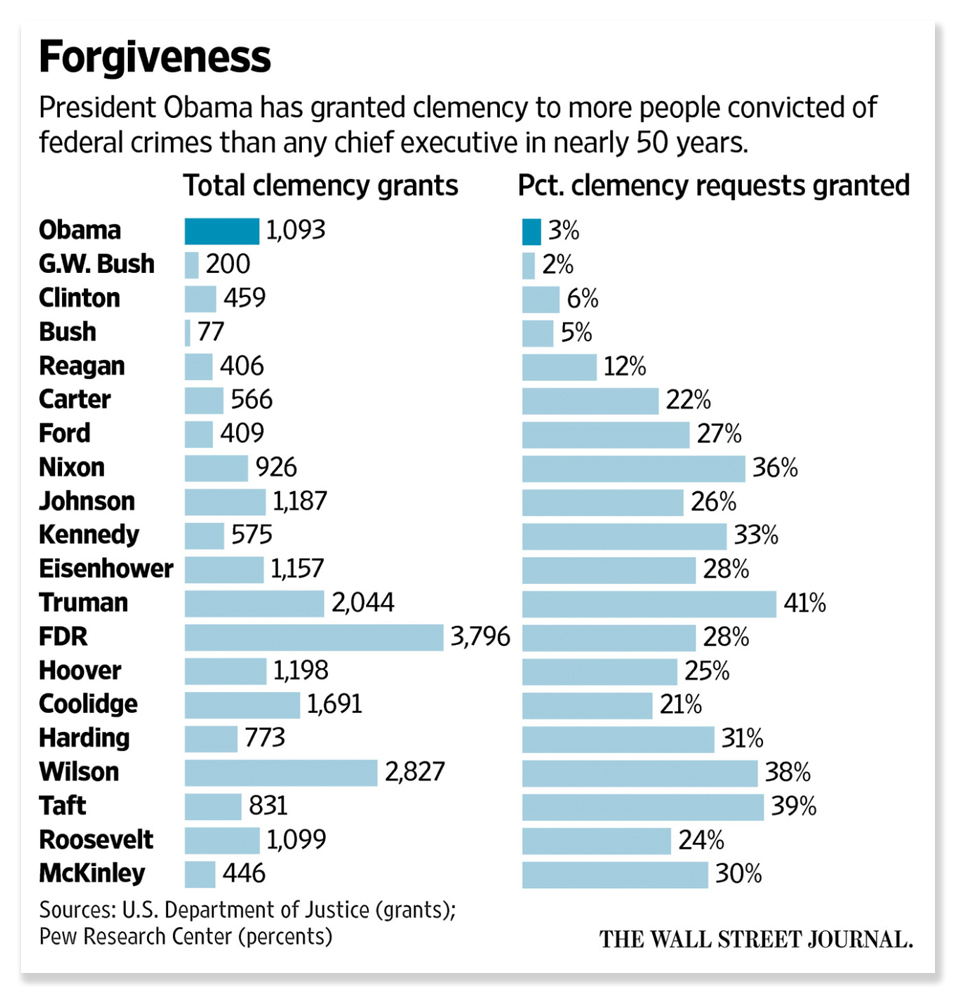We’re still doing a weekly newsletter… we’re just posting pieces of it every day. The news is fresher this way…
IT’S QUIET OUT THERE… TOO QUIET
 President Obama has gotten strangely quiet about granting clemencies since his last 79 commutations right before Thanksgiving. He’s granted 1,023 commutations so far and denied 14,485, without much pattern as to why some are granted and many are turned down. As of today, there are 13,042 petitions still on file and only 32 days left to do something about them.
President Obama has gotten strangely quiet about granting clemencies since his last 79 commutations right before Thanksgiving. He’s granted 1,023 commutations so far and denied 14,485, without much pattern as to why some are granted and many are turned down. As of today, there are 13,042 petitions still on file and only 32 days left to do something about them.
Last week, another coalition of ex-prisoners, advocates, defense attorneys and former prosecutors joined the chorus urging Obama to grant blanket clemencies to drug offenders before his term ends January 20.
 But at a breakfast event last week, Attorney General Loretta Lynch poured cold water on the notion of any blanket commutation. “When you’re talking about clemency,” she said, “…it’s a very individualized decision. I think it would be hard to craft a system for a blanket commutation of a class of people.”
But at a breakfast event last week, Attorney General Loretta Lynch poured cold water on the notion of any blanket commutation. “When you’re talking about clemency,” she said, “…it’s a very individualized decision. I think it would be hard to craft a system for a blanket commutation of a class of people.”
Some have suggested that the pace of commutations has slowed because the President is preparing a sweeping clemency gesture. After issuing two batches of commutations monthly since September, the Obama pen has lain dormant for almost 4 weeks. With time to act on the remaining applications waning, there is little explanation for the inaction other than plans are underway for a major clemency action.
We’ll know in a month.
Wall Street Journal, Barack Obama Weighs Final Requests for Clemency (Dec. 17, 2016)
CNN, AG Loretta Lynch says don’t expect blanket pardons from Obama (Dec. 15, 2016)

HOPE FOR SENTENCING REFORM IN THE NEW YEAR?
 Based on their public comments, President-elect Trump and Attorney General-designate Jeff Sessions may well roll back federal oversight of troubled police forces, escalate the war on drugs, enlarge the role of private prisons, accelerate deportations, and use the threat of financial sanctions to challenge so-called sanctuary cities.
Based on their public comments, President-elect Trump and Attorney General-designate Jeff Sessions may well roll back federal oversight of troubled police forces, escalate the war on drugs, enlarge the role of private prisons, accelerate deportations, and use the threat of financial sanctions to challenge so-called sanctuary cities.
But those inclined to look for a silver lining in 2017 may find one on Capitol Hill.
A New York Times/Marshall Project analysis last week suggested four reasons why the odds of sentencing reform may be better than critics fear.
First, 2017 is not an election year, meaning legislators have less to from critics for take unpopular stands. Second, President Obama will be gone, and with him the almost fanatical resistance to any position urged by the President. Third, one of sentencing reforms biggest opponents, Jeff Sessions, will be gone from the Senate. While as attorney general, Sessions will be able to encourage a presidential veto, he won’t be be joining the obstructionists who this year never let a sentencing reform bill come to a vote at all. Finally, the Republican leadership will be looking very hard for bipartisan successes to demonstrate that Washington is no longer in a state of ideological paralysis. On the short list of things Congress could do to reassure voters that government is back in business, criminal justice ranks near the top.
The Marshall Project, Why Congress May Bring Criminal Justice Reform Back to Life (Dec. 16, 2016)

